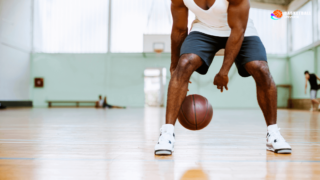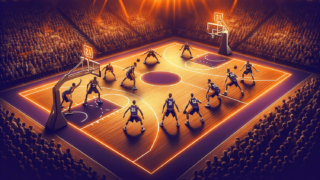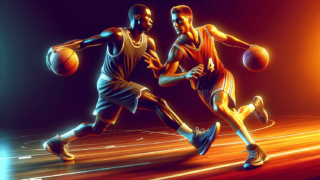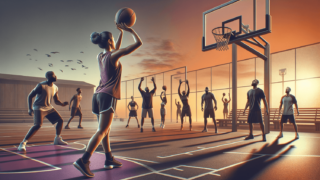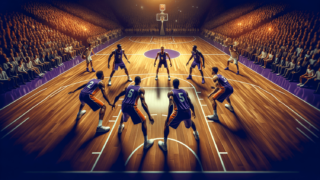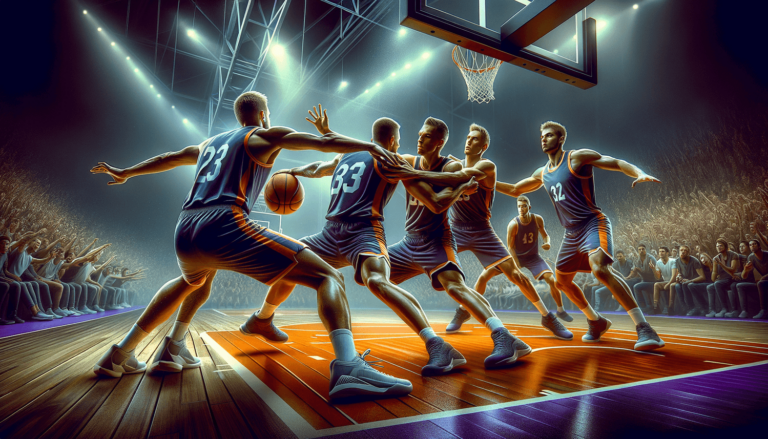
Defense may not always be the most glamorous aspect of basketball, but it’s a critical part of the game that separates the good players from the great ones. Whether you’re prowling the hardwood like a defensive menace, or simply yearning to elevate your on-court intelligence, you’ve come to the right place! In this exciting and insightful blog post, we’ll delve into the world of defensive IQ and provide you with actionable tips and strategies to help you establish yourself as a defensive savant. Let’s get ready to hold our opponents to pitiful shooting percentages and claim victory, one stifling defensive stand at a time!
How to Improve Your Basketball Defense IQ?
To improve your basketball defense IQ, focus on building your fundamentals, understanding offensive tendencies, and enhancing your communication skills. Start by mastering defensive stances, footwork, and off-ball movement. Study game film and analyze opponents’ playing styles to anticipate plays before they happen. Develop your spatial awareness and court vision to identify potential threats and be proactive in helping teammates. Lastly, communicate effectively and consistently with your teammates during games to establish a well-coordinated defense.
Master the Fundamentals of Defense
Before diving into the intricacies of improving your defense IQ, it is crucial to establish a solid foundation in the basics of basketball defense. These essential skills lay the groundwork for becoming a versatile and efficient defender. Let’s explore some key aspects and how you can improve them.
Defensive Stance
A proper defensive stance is the cornerstone of good basketball defense. To develop a strong stance, start by bending your knees and lowering your center of gravity. Your feet should be shoulder-width apart, with the weight primarily on the balls of your feet. Your arms should be extended to the sides with your hands up and palms facing out. When in this position, you are best prepared to move quickly and respond to any offensive player’s movements.
Footwork
Fluid and agile footwork is essential for staying in front of your opponent and making quick changes of direction. Practice side-to-side shuffling and work on the drop step to maintain balance and avoid reaching or lunging defensively. Also, incorporate agility drills into your workout routine to sharpen your overall foot speed.
Off-Ball Movement
In basketball, you will likely spend a lot of time away from the ball. Learning proper off-ball positioning and movement will enable you to maintain pressure on both the ball handler and potential receivers, intercept passes, and contest shots. Understand help-side defense, learn to deny passing lanes, and master the art of rotating when a teammate is beaten off the dribble.
Read the Offense and Anticipate Plays
Boosting your basketball defense IQ involves understanding the opponent’s offensive scheme and identifying potential scoring opportunities before they occur. Analyzing game film, familiarizing yourself with common plays, and knowing your adversary’s tendencies can boost your defensive prowess considerably.
Scouting the Opposition
One way to sharpen your defense is to study the opposing team or player’s strengths and weaknesses. Are they more effective at driving to the hoop or shooting from beyond the arc? Are they more prone to using their left or right hand? Having this information can help you strategize your defense and give you an advantage over your opponents.
Recognizing Common Plays
Developing the ability to recognize and anticipate common plays will give you an edge when it comes to defending. Pay attention to opponents’ screens, pick-and-rolls, and isolation plays, and learn to predict their next steps. Acquiring this knowledge allows you to cut off offensive options more effectively and can even lead to steals or forced turnovers.
Watch Game Film
Studying game film is an essential tool for breaking down offensive patterns and understanding player tendencies. Viewing previous games allows you to identify areas of improvement and gain valuable insights into how opposing teams plan to exploit your defense. Make a habit of watching both your team’s games and those of potential opponents.
Develop Court Vision and Awareness
Most people focus on developing court vision and awareness for improving their offensive game, but it’s just as important for enhancing your defensive skills. Boosting your defensive vision directly affects your basketball IQ and your ability to react and adapt on the court.
Observe the Ball Handler’s Non-Dominant Hand
When defending, focus on the ball handler’s non-dominant hand. Most players have a preference for using their dominant hand, and recognizing this can influence how you choose to defend them. Try to force the ball handler to use their weaker hand, making it more difficult for them to drive by or make accurate passes.
Understand the Importance of Help-Side Defense
Help-side defense is a vital component of a strong team defense. This form of off-ball defense requires an understanding of when to shift and cover opponents that aren’t your primary assignment. Enhancing your court vision can help you recognize when a teammate needs assistance, allowing you to provide timely support and limit easy scoring opportunities for the opposing team.
Keep Your Head on a Swivel
Maintaining constant awareness of both the ball handler and potential pass recipients is crucial for effective defense. Basketball is a fast-paced game, and keeping your head on a swivel enables you to quickly assess evolving plays and adjust your positioning accordingly.
Communicate Clearly and Often
Effective communication is vital in developing your basketball defense IQ. A well-coordinated defense relies on constant communication between teammates to synchronize their movements, adapt to offensive changes, and provide support when needed. By cultivating strong communication skills, you can position yourself as a reliable defensive player and contribute to a cohesive team defense.
Call Out Screen Directions
On the basketball court, screens can create space and generate open shot opportunities for the offense. As a defender, it is important to call out screen directions so your teammates are aware and can adjust accordingly. Informing your teammates about impending screens enables them to avoid being caught off guard and maintain good defensive positioning.
Alert Teammates about Mismatches
During fast breaks or quick offensive plays, defensive mismatches can occur. Communicating these mismatches to your teammates is essential for adjusting your team’s defense accordingly. For example, if a smaller guard is left alone to defend a taller center, it’s crucial to inform your team so they can provide assistance and avoid an easy scoring opportunity for the opponent.
Encourage and Remind Your Teammates
Consistent communication keeps everyone on the same page and focused on their responsibilities throughout the game. Encourage your teammates to maintain intensity on defense and remind them of opponents’ tendencies or adjustments that need to be made during the game. A supportive and communicative defensive unit is essential for success on the court.
Learn from the Greats
One of the most enjoyable and informative ways to improve your basketball defense IQ is by watching and learning from the legends of the game. Studying the moves, techniques, and strategies of some of the best defenders in basketball history can offer valuable insights and inspiration for your defensive development.
Analyze the Techniques of Elite Defenders
Players like Scottie Pippen, Gary Payton, and Kawhi Leonard offer invaluable examples of stellar defense. Observe their footwork, help-side defense, and anticipation of offensive movements. Take note of their communication style, quickness, and adaptability. These elements combine to make them among the best defenders the game has ever seen.
Adopt Defensive Principles from Top Coaches
Successful coaches like Gregg Popovich, Phil Jackson, and Pat Riley have created powerful defensive systems that contribute to their teams’ success. Study their philosophies and the defensive principles they emphasize, like strong help defense, contesting every shot, and disrupting the opponent’s offensive rhythm. Integrating their teachings into your defense can significantly improve your overall defensive intelligence.
Emulate the Defensive Mindset of NBA Legends
Elite defenders like Michael Jordan and Kobe Bryant were known for their competitive fire, relentlessness, and determination to shut down their opponents. Emulating their attitude and understanding the importance of a strong defensive foundation can help you unlock your full potential and elevate your basketball defense IQ.
Conclusion
Increasing your basketball defense IQ is a long-term process that involves diligently honing your skills, awareness, and communication abilities. Remember to master the fundamentals, study the offensive schemes of your opponents, enhance your court vision, communicate effectively with your teammates, and learn from the greats of the game. By embracing these steps, you can make significant strides in your defensive skills and become an indispensable asset to your team. Now, it’s time to hit the hardwood and put these strategies into practice!
Train Consistently and Intelligently
Improving your basketball defense IQ requires ongoing dedication to refining your skills and keeping your body in optimal condition. By focusing on both the physical and mental aspects of the game, you can become a more effective and intelligent basketball defender. Here are some tips for consistent and intelligent training.
Strength and Conditioning
Physical conditioning is a vital aspect of becoming an elite defender. A combination of strength, speed, endurance, and agility is necessary to stay in front of your opponents, contest shots, and hustle during crucial moments in the game. Incorporate a variety of exercises into your training routine, focusing on building core strength, improving lateral quickness, increasing vertical leap, and boosting overall stamina.
Individual Skill Drills
Continually working on individual defensive skills is crucial for developing your basketball defense IQ. Identify specific weaknesses in your game and target them during your practice sessions. Some essential drills include closeout drills to practice contesting shots, defensive slide drills to improve footwork and lateral movement, and one-on-one drills to refine your skills against varying offensive styles.
Participate in Team Practices and Scrimmages
Although individual skills are important, defense in basketball is a collaborative endeavor. Regularly participating in team practices and scrimmages is essential for developing defensive chemistry and communication with your teammates. Additionally, these settings allow you to practice your newly acquired skills and strategies against real opponents, fine-tune your awareness and positioning, and gain valuable feedback from your coaches and peers.
Stay Committed to Learning and Growth
As with any skill, there is always room for improvement when it comes to basketball defense IQ. Remaining committed to continuous learning and growth is the key to unlocking your full potential as a defender. Here are some suggestions for maintaining a growth mindset and staying committed to improvement.
Study the Game Regularly
Paying close attention to both your own games and professional matches is critical for expanding your understanding of the game and identifying new defensive strategies. Make a habit of analyzing game film, not only of your own team but also of successful professional players and teams, to broaden your defensive horizons.
Seek Feedback and Apply It
Constructive feedback from coaches, teammates, and even opponents can be invaluable for enhancing your basketball defense IQ. No matter your skill level, maintaining an open mind and being receptive to constructive criticism can help you accelerate your defensive development. Welcome feedback and use it to make adjustments and improvements to your game.
Track Your Progress and Set Goals
Keeping a record of your progress and setting specific, attainable goals can serve as a powerful motivator and guide for your defensive growth. Reflect on your recent games and practices to detect areas that need improvement or new techniques to incorporate. By setting realistic milestones and monitoring your progress, you can remain focused on attaining new heights in your defensive abilities.
Embrace Challenges and Stay Persistent
Improving your basketball defense IQ requires persistence and resilience in the face of challenges. Whether it’s a tough game, a challenging opponent, or a plateau in your development, remain determined and confident in your pursuit of basketball excellence. Embrace each challenge as an opportunity for growth and learning, and never lose sight of your love for the game.
Frequently Asked Questions (FAQ) about Basketball Defense IQ
If you’re looking to enhance your basketball defense IQ, you may have a few questions related to the topic. In this FAQ section, we’ve compiled ten common questions you might ask, along with concise and informative answers to help you on your journey to becoming a defensive mastermind.
1. Is it more important to be quick or strong when playing defense in basketball?
Both quickness and strength are essential for effective basketball defense. Quickness allows you to stay in front of your opponent and react to sudden movements, while strength helps you maintain your ground and contest shots. To be a well-rounded defender, focus on developing both aspects through targeted training and practice.
2. How can I improve my reaction time on defense?
Improving reaction time requires consistent practice and a combination of skill-specific drills and exercises. Incorporating agility drills, plyometrics, and reaction-based exercises into your training regimen will help improve your overall reaction time. Additionally, enhancing your basketball defense IQ by studying the game and understanding offensive tendencies will allow you to better anticipate your opponent’s moves.
3. How do I get better at perimeter defense?
To excel at perimeter defense, focus on mastering defensive stances, improving footwork and lateral quickness, and developing strong communication skills. A solid understanding of defensive principles, off-ball positioning, and opponent scouting will also be instrumental in becoming an effective perimeter defender.
4. What is the best technique for defending a post player?
Effective post defense involves maintaining a low, strong stance to counteract potential post moves, using your body to apply pressure without fouling, and utilizing active hands to both steal the ball and make shots difficult to execute. Anticipating possible moves and using your strength and positioning to deny comfortable scoring opportunities is also crucial.
5. How do I know when to switch on defense?
Recognizing when to switch on defense requires strong communication and court awareness. Situations in which a switch may be necessary include when two defenders are caught on the same offensive player, when screens or picks create a significant mismatch, or when a teammate calls for a switch. Practicing team defense regularly and strengthening team communication will help you recognize and execute effective switches.
6. How do I improve my help-side defense?
Improving help-side defense involves mastering off-ball positioning, effectively communicating with teammates, and developing strong court vision. Familiarize yourself with the principles of help-side defense, practice shifting between on-ball and off-ball positions, and be prepared to rotate and provide assistance when necessary.
7. Why is shot blocking not the only measure of good defense?
While shot blocking is an important aspect of defense, it is not the sole determinant of defensive strength. Factors such as positioning, communication, anticipation, and disrupting the opponent’s offensive flow all contribute to effective defense. A well-rounded defender is not solely focused on shot blocking but excels in all aspects of defensive play.
8. How can I avoid fouling when playing aggressive defense?
Avoiding fouls while playing aggressive defense requires maintaining proper defensive techniques, like keeping your hands up and avoiding reaching, as well as anticipating offensive actions before they happen. Additionally, employing quick footwork and maintaining balance will help you avoid unnecessary contact that can lead to fouls.
9. What is the most important defensive skill for a point guard?
For a point guard, one of the most important defensive skills is on-ball pressure. By applying consistent defensive pressure, point guards can disrupt the opponent’s offensive rhythm, cause turnovers, and prevent easy passes. Good communication, court vision, and agility are essential for being an effective defensive point guard.
10. How can I become a better leader on defense?
To emerge as a defensive leader, work on enhancing your communication skills and commitment to providing consistent effort on the court. Studying the game and understanding opponents’ tendencies will allow you to offer valuable insights and guidance to your teammates. Furthermore, leading by example through strong defensive effort and dedication will inspire your teammates to follow suit.
Featured Posts
- No pillar pages found.
